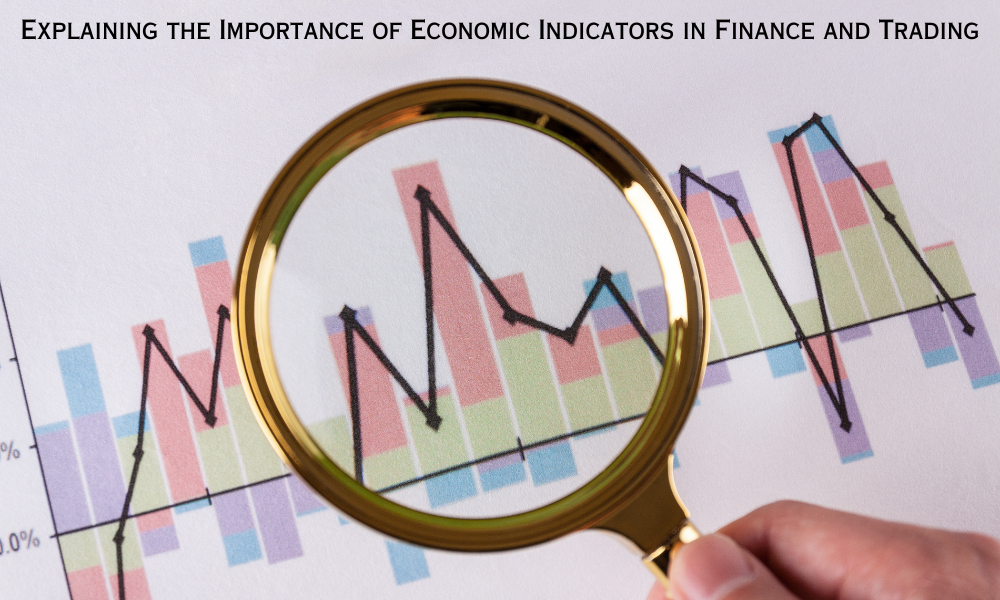
Explaining the Importance of Economic Indicators in Finance and Trading
Economic indicators play a pivotal role in shaping the world of finance and trading.
These vital statistics provide insights into a country's economic performance, helping investors and traders make well-informed decisions. From Gross Domestic Product (GDP) to unemployment rates and inflation figures, economic indicators offer crucial information that influences financial markets.
This blog will explore the role of economic indicators in trading and finance and how they direct investors to profitable possibilities.
I. Understanding Economic Indicators
A. Definition and Purpose
- Economic indicators: Definition and examples.
- The role of economic indicators in assessing an economy's health.
- Their significance in making informed financial decisions.
B. Types of Economic Indicators
- Leading, lagging, and coincident indicators.
- Key indicators: GDP, unemployment rate, inflation rate, and more.
- How each indicator provides unique insights into economic conditions.
II. Impact of Economic Indicators on Financial Markets
A. Market Sentiment and Perception
- How positive economic indicators boost investor confidence.
- The relationship between indicators and market optimism/pessimism.
- Implications for stock market performance.
B. Influence on Monetary Policy
- Central banks' response to economic indicators.
- How indicators guide interest rate decisions.
- Impact on bond markets and currency values.
C. Impact on Asset Prices
- The correlation between economic indicators and asset prices.
- Role of indicators in determining the value of currencies, stocks, and commodities.
- Trading opportunities based on indicator-driven market movements.
III. Economic Indicators and Trading Strategies
A. News-Based Trading
- Utilizing economic indicators to capitalize on market volatility.
- Strategies for trading before and after key data releases.
- Pros and cons of news-based trading.
B. Long-Term Investment Decisions
- Considering economic indicators in long-term investment strategies.
- How indicators guide portfolio allocation.
- Case studies demonstrating the impact of indicators on investment decisions.
IV. Assessing Economic Stability and Risk
A. Measuring Economic Stability
- The role of indicators in gauging economic stability.
- How economic indicators impact a country's credit rating.
- Implications for borrowing costs and investment climate.
B. Evaluating Systemic Risk
- The connection between economic indicators and systemic risk.
- Indicators as early warning signals for potential financial crises.
- The significance of risk management in response to indicator signals.
V. The Global Perspective
A. Interconnectedness of Economies
- How global economic indicators influence international markets.
- Cross-border trade and investment in response to economic data.
- Implications for multinational corporations and global investors.
B. Impact on Emerging Markets
- How economic indicators affect emerging economies differently.
- Volatility and opportunities in emerging market investments.
- Navigating risks and rewards in these regions.
VI. Limitations and Challenges
A. Data Accuracy and Revisions
- The importance of accurate economic data.
- Potential revisions and their impact on market perceptions.
- Mitigating risks related to data reliability.
B. Unexpected Events and Black Swans
- The role of economic indicators during unexpected events.
- The challenge of adapting trading strategies in uncertain times.
- Strategies for risk management during periods of heightened uncertainty.
VII. The Future of Economic Indicators in Finance and Trading
A. Technological Advancements
- The impact of technology on data collection and analysis.
- The potential for real-time economic indicator monitoring.
- How technology shapes trading strategies.
B. Evolving Market Sentiment
- The changing role of economic indicators in an evolving financial landscape.
- The emergence of alternative indicators and their influence on trading decisions.
- Balancing traditional indicators with new sources of data.
Conclusion
Economic indicators form the foundation of finance and trading, providing critical insights into an economy's health and guiding market sentiment. From investors seeking profitable opportunities to traders navigating short-term fluctuations, understanding the importance of economic indicators is essential.
These indicators shape financial markets, influence investment strategies, and help manage risks in an interconnected global economy. By staying informed and incorporating economic data into decision-making processes, investors and traders can navigate the complexities of finance with confidence and capitalize on opportunities in the ever-changing landscape of the financial world.
